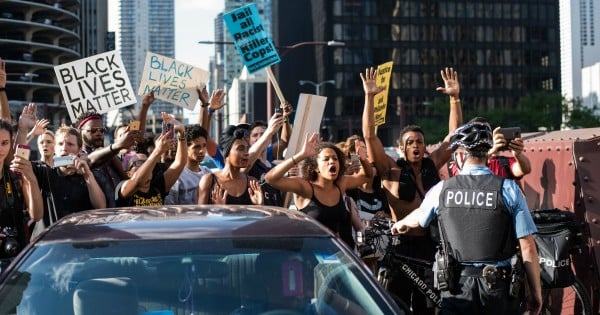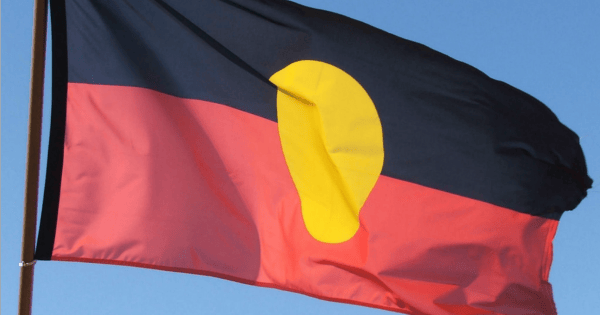
Scrolling through my Facebook feed, Twitter feed and email inbox, I’m seeing and reading a lot about the #blacklivesmatter movement in the US.
In case you missed it, it’s a push back against the daily and disproportionate violence against black people in the US.
Everyone from celebrities (Kanye, Beyonce, Jay Z) to normal people ordering their Starbucks under the name “BlackLivesMatter” so that baristas call it out, have pushed the movement into the nation’s conscience, to a point where it’s now a large and vocal modern civil rights movement.

Image: Getty.
It's filtered into the Australian psyche, too.


Top Comments
For any cause that aims to address inequality to be successful, it has to be adopted and owned by the people it is aimed at helping.
Have the Indigenous and non white people in Australia said they want this? Or is it another attempt by well meaning white people to push an agenda onto on white people - because *we* think it's a good one?
White people have a long history of taking control and doing what they think is important - because that would be important to us. In cases of inequality, those who are not part of that group need to stand back and ask what the group members think is important to them? What steps do they want to take?
Perhaps Indigenous peoples don't want a carbon copy grassroots group from America. Perhaps they would prefer to address the issues in a different way - maybe through education in schools and with white people sitting down in groups and just listening to their stories. I don't know, but neither does any other white person if we haven't asked!
The success of Standing Rock in the US right now is precisely because the Native Americans took control of their own cause. They initiated it, they defined it and they decided how it would play out. White people have taken a back seat (as well they should), and that has contributed to their success.
If you really believe the lives of our Indigenous and other non white citizens is important, then get educated and get involved in THEIR groups, in THEIR actions. It is THEIR experience of inequality, let THEM tell us what they need to help heal that.
As you can probably see in the comment section, most Australians aren't ready to admit the institutionalised racism of other countries, let alone Australia. I guess it's a bitter pill to swallow. There are several solidarity movements among Aboriginal Australians, and several hundred (probably thousands of) campaigns for change. Unlike a lot of other indigenous and minority groups around the world, there is a huge amount of diversity in Aboriginal Australia. There are over 200 Aboriginal groups in Australia, all with different land, languages, customs and ideas. I don't really know why we don't have this movement as strong here, I am so afraid of the Australian government's tendency to follow the American government, and I don't want guns to come back to this country the same way they are in the US. I know that will only make it worse for our people and other ethnic minorities. To all of you who are saying #allLivesMatter. Of course they do, the movement is not saying #BlackLivesMatterButWhiteLivesDon't, it is identifying an issue that is killing hundreds of people a year needlessly, and asking for change. I ask you what you would do if the tables were turned? If your sons were being murdered for selling CDs at a corner, if your husband was shot in his car in front of your daughter, if your brother was held down by four policemen and shot repeatedly; and you knew it was solely because of their race. This is not a question of whether white people matter, we know they matter, white people have been mattering for most of human history. Most of the human history we know is written from a white perspective. It is time to acknowledge that black Americans are more likely to be shot by police than white Americans, and admit that there is something wrong with that.
It's true more blacks than white are shot by police in America. The black population according to the FBI at 13% of the population commits more than half the crimes in the US. It's also true most of those killings occurred in an exchange of gunfire between police and criminals.
The murder toll in just Chicago from Nov 2001 to end of 2015, at 7001 is close to the 8250 combat losses for the same period in Iraq and Afghanistan combined. Chicago is a war zone with thousands of black on black deaths. But black lives matter only when a cop is firing back?
Where were these Black Lives Matter protesters after the slaying of Chicago’s little Tyshawn Lee, the 9-year-old lured into an alley and shot to death by a black man seeking gang-related vengeance against his father?
Did little Tyshawn’s murder at the hands of a black gangster–an all too common occurrence in Chicago–not warrant wall-to-wall news coverage or Al Sharpton and Jesse Jackson-style calls for “justice”? No. Why? Why didn't Tyshawns life matter to the movement?